2022年牛津深圳版中考英语复习---介词和连词课件(40张)
文档属性
| 名称 | 2022年牛津深圳版中考英语复习---介词和连词课件(40张) | 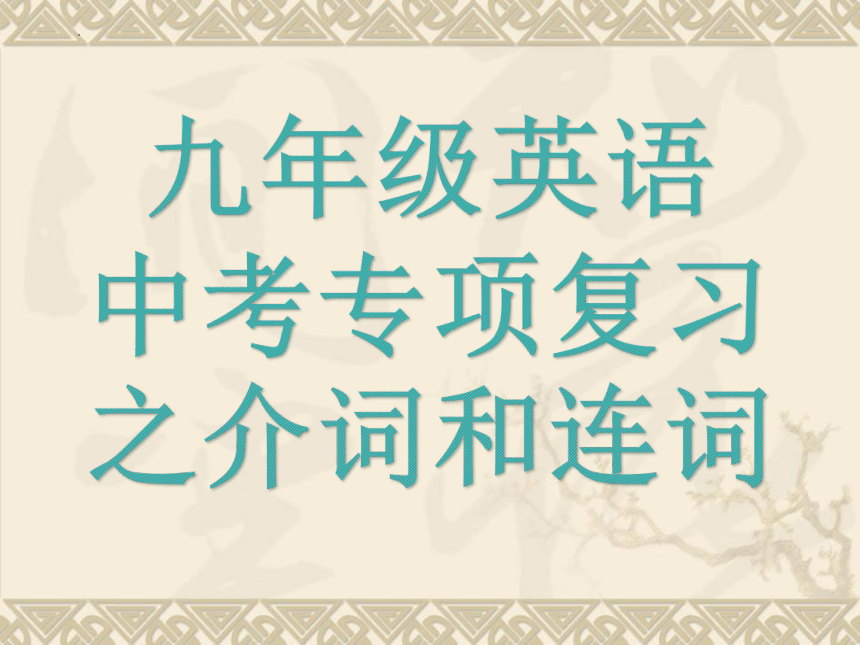 | |
| 格式 | pptx | ||
| 文件大小 | 517.7KB | ||
| 资源类型 | 教案 | ||
| 版本资源 | 牛津深圳版 | ||
| 科目 | 英语 | ||
| 更新时间 | 2022-05-09 20:04:58 | ||
图片预览

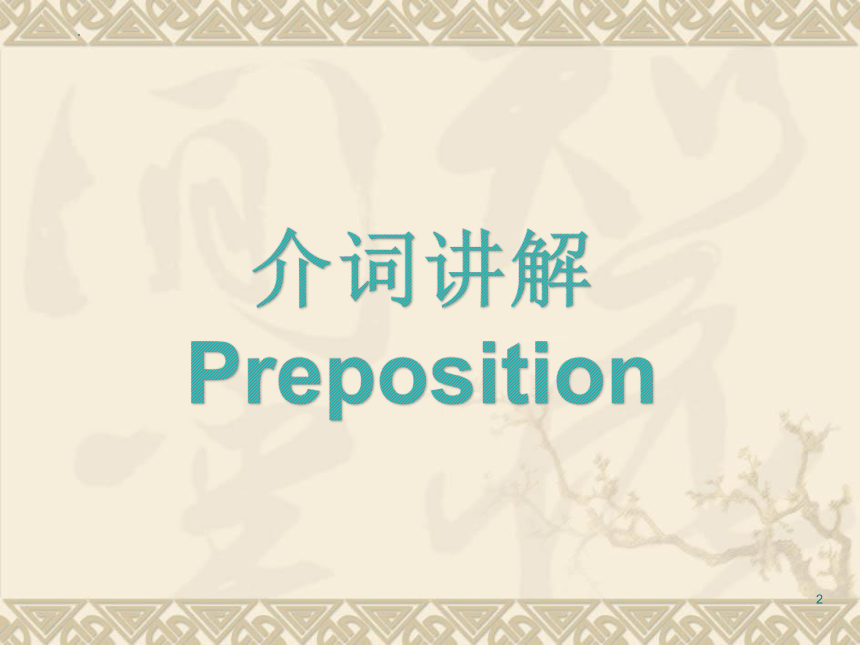
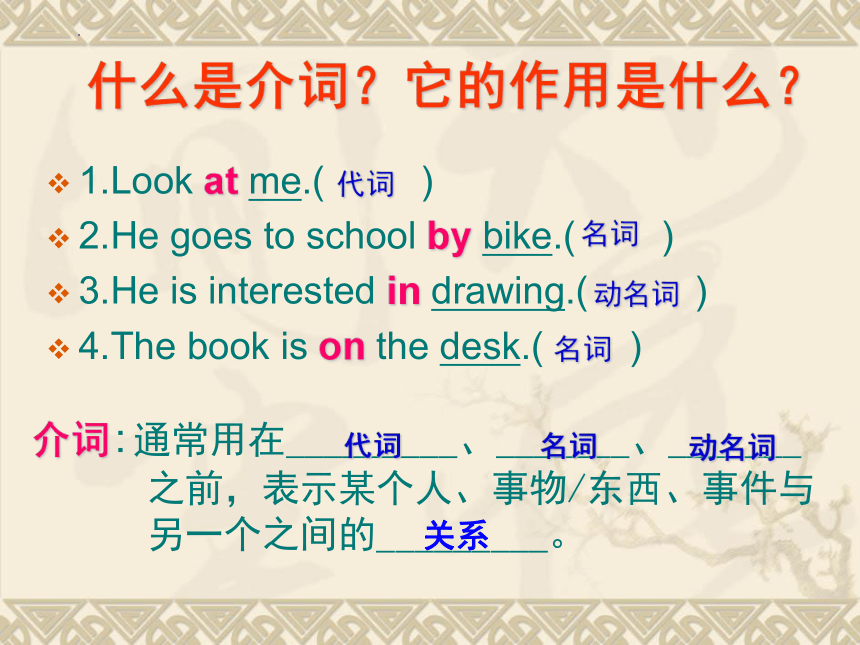
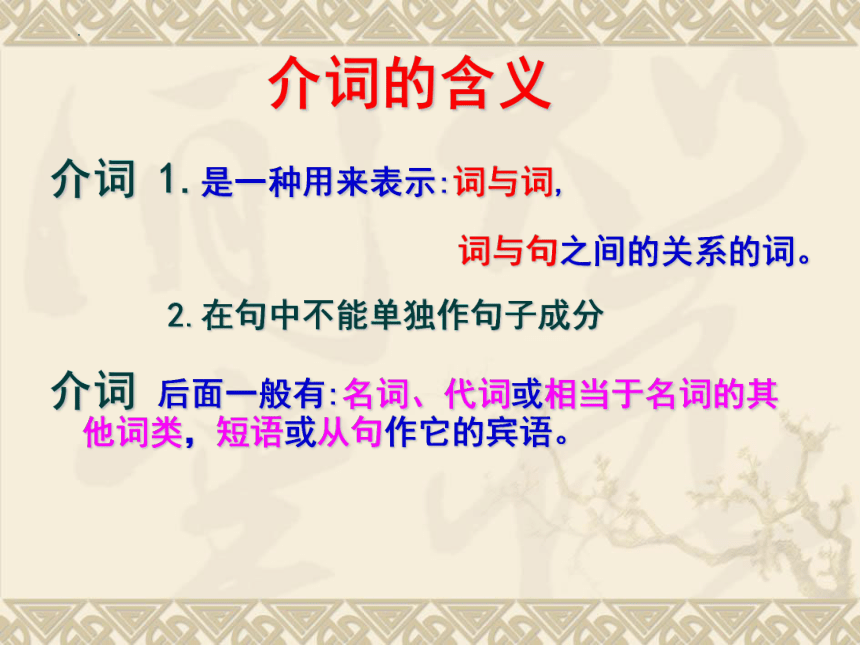
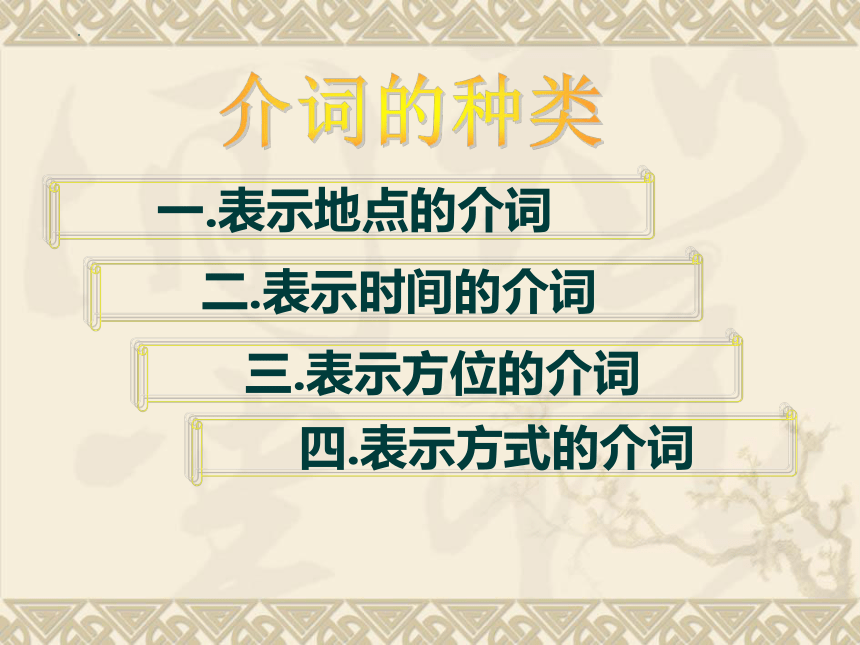
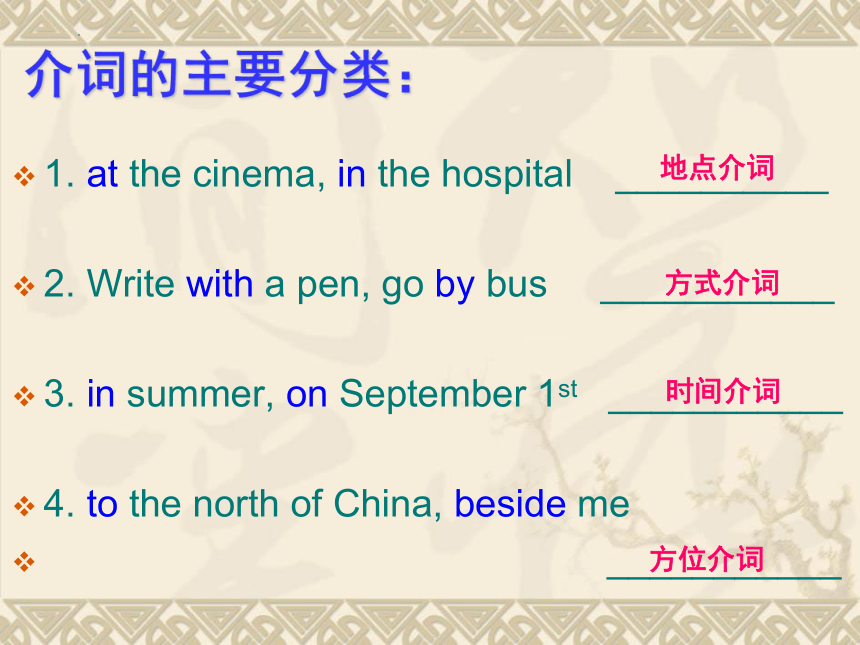
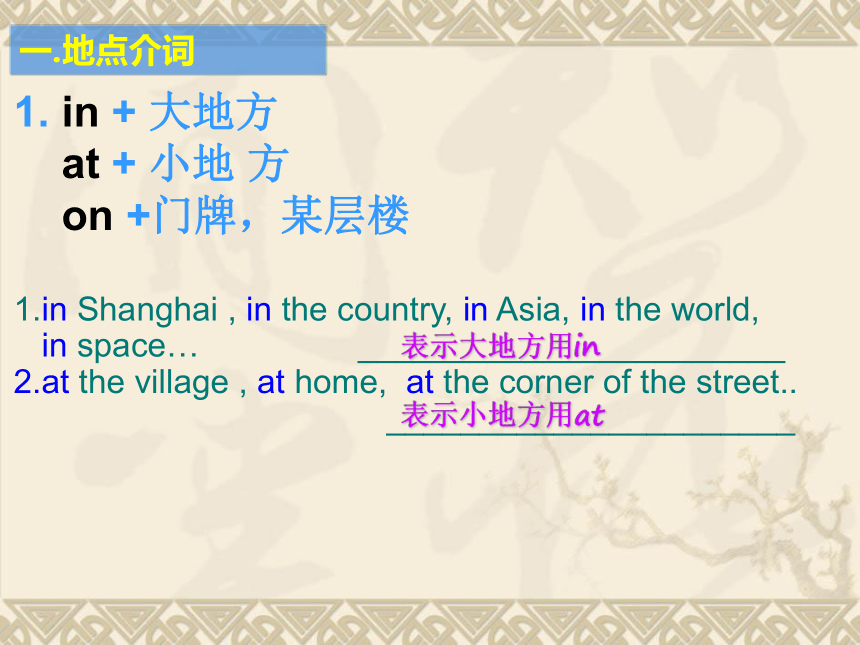
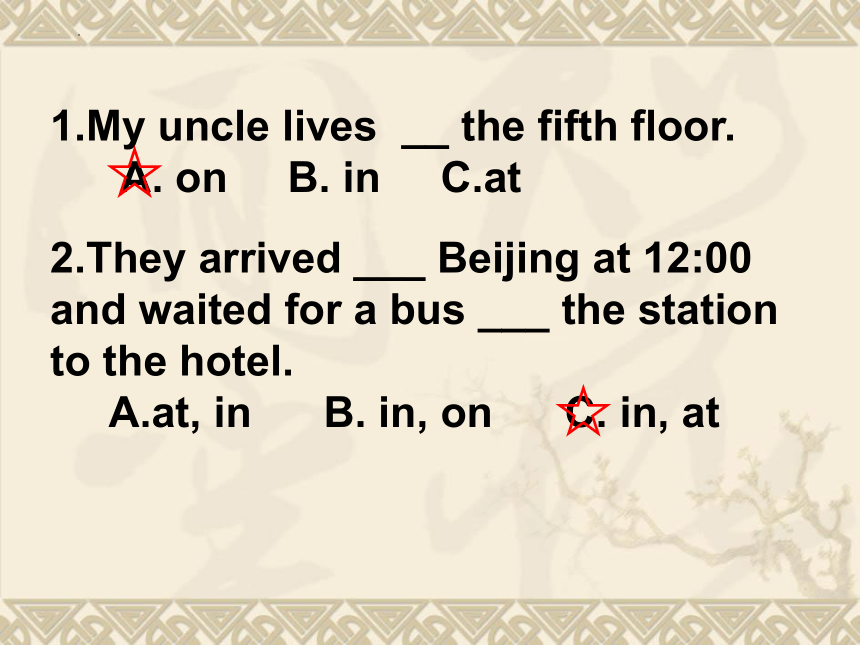
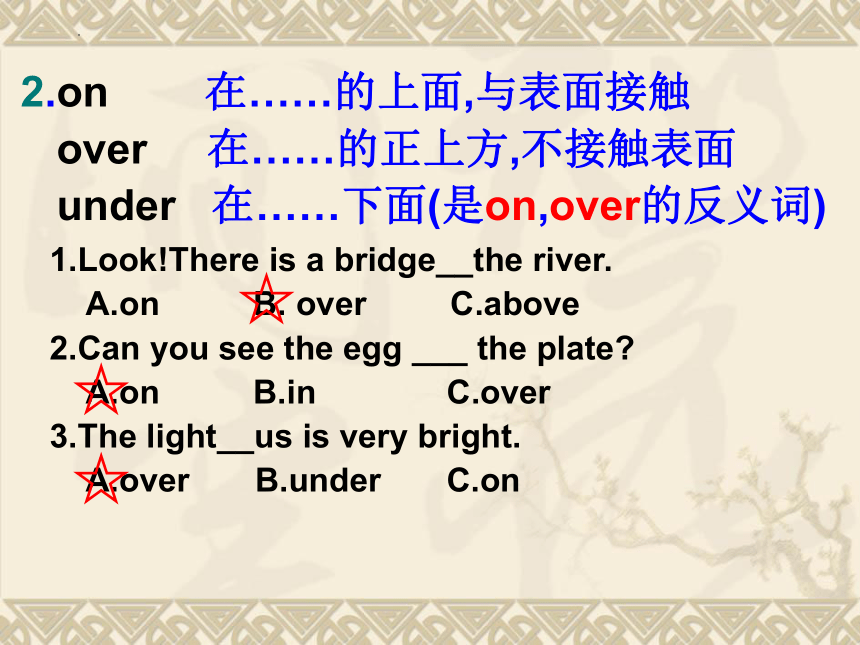
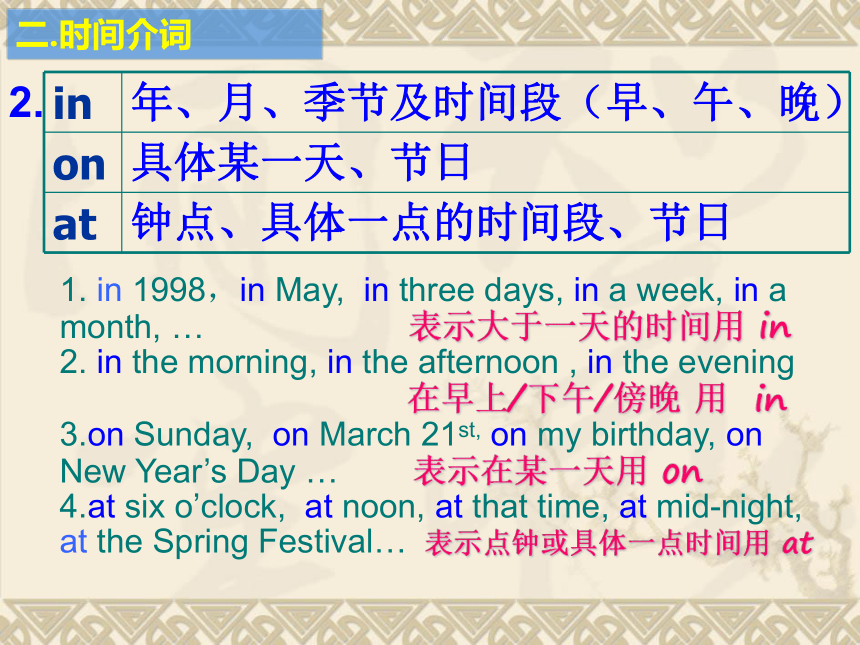
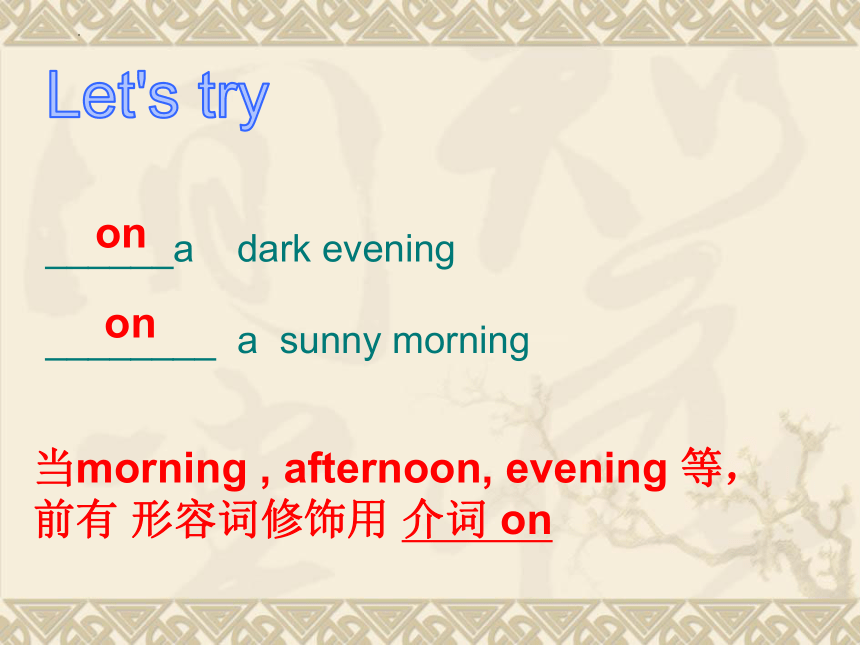
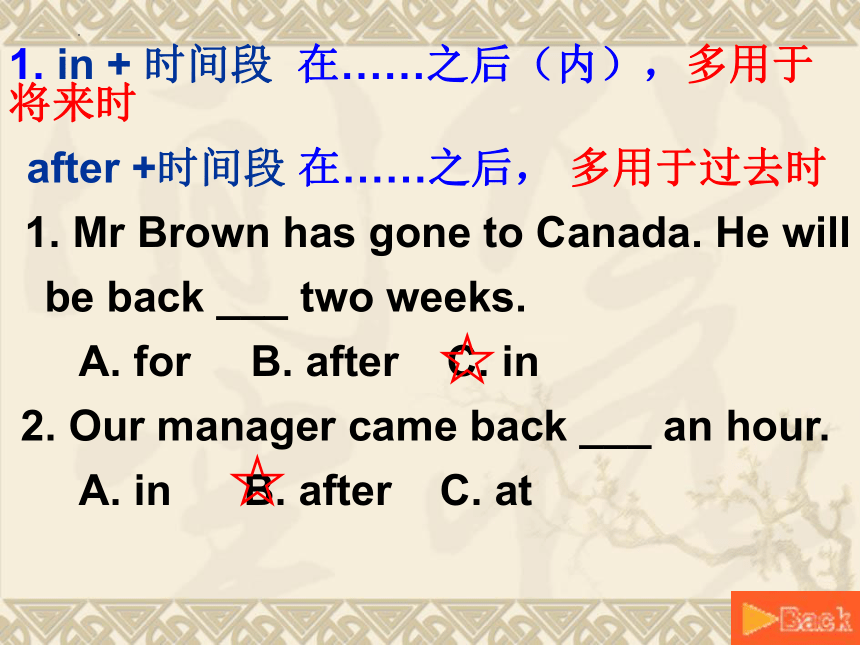
文档简介
(共40张PPT)
九年级英语
中考专项复习
之介词和连词
介词讲解Preposition什么是介词?它的作用是什么?
1.Look at me.( )
2.He goes to school by bike.( )
3.He is interested in drawing.( )
4.The book is on the desk.( )
代词
名词
动名词
介词:通常用在_________、_______、_______
之前,表示某个人、事物/东西、事件与
另一个之间的_________。
名词
代词
名词
动名词
关系
介词 1.是一种用来表示:词与词,
词与句之间的关系的词。
2.在句中不能单独作句子成分
介词 后面一般有:名词、代词或相当于名词的其他词类,短语或从句作它的宾语。
介词的含义
介词的种类
一.表示地点的介词
三.表示方位的介词
二.表示时间的介词
四.表示方式的介词
介词的主要分类:
1. at the cinema, in the hospital __________
2. Write with a pen, go by bus ___________
3. in summer, on September 1st ___________
4. to the north of China, beside me
___________
地点介词
方式介词
时间介词
方位介词
1. in + 大地方
at + 小地 方
on +门牌,某层楼
1.in Shanghai , in the country, in Asia, in the world,
in space… _______________________
2.at the village , at home, at the corner of the street..
______________________
表示小地方用at
表示大地方用in
一.地点介词
1.My uncle lives __ the fifth floor.
A. on B. in C.at
2.They arrived ___ Beijing at 12:00 and waited for a bus ___ the station to the hotel.
A.at, in B. in, on C. in, at
2.on 在……的上面,与表面接触
over 在……的正上方,不接触表面
under 在……下面(是on,over的反义词)
1.Look!There is a bridge__the river.
A.on B. over C.above
2.Can you see the egg ___ the plate
A.on B.in C.over
3.The light__us is very bright.
A.over B.under C.on
2.
in 年、月、季节及时间段(早、午、晚)
on 具体某一天、节日
at 钟点、具体一点的时间段、节日
1. in 1998,in May, in three days, in a week, in a month, … 表示大于一天的时间用 in
2. in the morning, in the afternoon , in the evening
在早上/下午/傍晚 用 in
3.on Sunday, on March 21st, on my birthday, on New Year’s Day … 表示在某一天用 on
4.at six o’clock, at noon, at that time, at mid-night, at the Spring Festival… 表示点钟或具体一点时间用 at
二.时间介词
Let's try
______a dark evening
________ a sunny morning
on
on
当morning , afternoon, evening 等,前有 形容词修饰用 介词 on
1. in + 时间段 在……之后(内),多用于将来时
after +时间段 在……之后, 多用于过去时
1. Mr Brown has gone to Canada. He will
be back ___ two weeks.
A. for B. after C. in
2. Our manager came back ___ an hour.
A. in B. after C. at
1. Mary is flying to France soon. She will arrive in Paris ___ the morning of July 9.
A. on B. in C. at
2. The twins were born __ a Friday evening.
A. in B. on C. at
3. We travelled overnight to Paris and arrived __5 o’clock __ the morning.
A. on, in B. at, in C. at, in
4. We finish our lessons ___ 11:30 and then
have a rest __ noon.
A. in , in B. at ,at C. in, at
1.
across 表示横穿,即从物体表面通过,与 on 有关
through 即从物体内部穿过,与 in 有关,为三维
past 从物体的旁边经过。
三.方位介词
Go across the street,and you’ll get there.
The two friends get a short cut to walk through the park.
On my way home, I always walk past a toy store.
2.
between 两者之间
among 三者及以上
三.方位介词
I will be back between five and six.
The man who is standing among the students is Ms Wong.
使用工具用介词 with
使用器官用介词 with
使用语言用介词 in
使用声音用介词 in
使用方法用介词 in 或by
四.方式介词
1.write with a pen, cut with a knife, lock with a lock… ____________________
2. see with our eyes, do with our hands, smell with our noses, eat with our mouths…
____________________
3. in English , in French , in your own words,
in three language… _____________________
4. in a loud voice, in a low voice…
___________________
5. in this way, by this means…
___________________
使用工具用介词 with
使用器官用介词 with
使用语言用介词 in
使用声音用介词 in
使用方法用介词 in 或 by
6.by bike, by bus, by train, by plane, by ship, by car… (on foot) by land 陆路, by sea 水路,by air 空运
_________________
但:on the bike, on the bus, on the train, on the plane, on the ship, in the car, in the taxi, in the boat …
7.in a read coat, the girl in yellow, the boy in white…
__________________
8.lie in bed, after a while, in the sun(在阳光下)
under the sun(天下,世界上;到底,究竟)
使用交通工具用 by
表示穿衣服用 in
固定搭配
( )
在里面能站直身体用on,不能站直身体用in
连 词 (Conjunction)
连 词 (Conjunction)
一、连词定义: 用来连接词、短语或句子的词。
e.g. I study English and Chinese.
Does he work at school or in the hospital
I get up early, but my brother gets up late.
二、分类:连词分为并列连词和从属连词两类。
三、用法
1.并列连词 --- 连接具有并列关系的词,短语或句子。 常见的有:
(1)表并列关系的and, both…and, not only…but also, neither…nor,as well as(也,和)等。
(2)表选择关系的or, either…or等。
(3)表转折关系的but, however等。
(4)表因果关系的for, so等。
考点一:
1)判断改错:
They sat down and talk about something.
They started to dance and sang.
I saw two men sitting behind and ate there.
F
F
F
eating
sing
talked
and (“和,并且”) 与 or (“否则”)
“and” 连接平行结构。
(1)肯定句中用“and” 表“和”;
(2)否定句中用“or”表“和” 。
2)翻译:① 我喜欢英语和数学。
② 我不喜欢英语和数学。
I like English _____ math.
I don’t like English ____ math.
and
or
= Study hard, _____ your math will be worse.
3)用 “and” 或“or” 填空:
Study hard, _____ your math will be better.
and
or
“and”意为“这样,那么”;
“or” 意为 “否则” 。
1. It’s getting warmer __ warmer.
A. and B. but C. or
2. He or the twins __ the USA.
A. comes from B. come from
C. is from
4. Not Tom but I ___ going to give the talk.
A. am B. is C. are
adj.比 + and + adj.比 表示越来越…
A or B 和 not A but B 结构作主语时,谓语动词要使用就近原则。
and, or, but, so 特殊用法
表转折的连词but 和however:
e.g. (他努力工作,但以失败告终。)
He worked hard, ______ he failed at last.
He worked hard. _________, he failed at last.
区别: but 后没有逗号;
however 后有逗号相隔。
but
However
考点二 :
观察句子 (判断对错):
(1)Although he is over sixty, but he works as hard as others.
改为:Although he is over sixty, he works as hard as others.
或 He is over sixty, but he works as hard as others.
(2)“Because John was ill, so I took him to the doctor.”
*although/ though 和but这两个关联词不能同时用。
同样,此句错误, because 和 so 等关联词都不能同时使用。
考点三 :
either A or B “或者A或者B”
neither A nor B “既不A也不B”
not only A but also B “不仅A而且B”
--- 连词词组 :
①Either you or I _____ going to the party.
(或者你或者我将去晚会。)
②Neither I nor he ______ seen the movie.
(我和他都没有看过这部电影。)
③Not only you but also he ________ French.
(不但你而且他也讲法语。)
【连接主语 时,谓语“就近原则”】
am
has
speaks
考点四
2. 从属连词---用来引导从句。
常见的从属连词用法辨析:
Mr. White was taking a shower _____ the UFO landed on the street.
A. where B. while C. when D. whether
C
While Mr. White was taking a shower,the UFO landed on the street.
考点一
“when” 和 “while”
when引导的状语从句的动作多为终止性动词,也为可持续动词;但while只能是可持续动词。
while强调“当……时候,正……”,后面常用进行时态。
1. Tom works in a hospital ___ Mary works in a company.
A. because B. until C. while
2. While his mother was washing, he ___ his homework.
A. do B. did C. was doing
3. The little boy fell alseep while he __ the music.
A. was listen B. was listening to
C. listened to
表示对比,“然而,而”
while表示“当…的时候”。 两个动词同时发生。必须使用延续性动词。
考点二
我父亲直到我们吃完饭时才回来。
My father ______ come back until we had supper.
not…until 直到……才
…till 直到……为止
翻译:他直到3岁才会讲话。
He ______get up until his mother wakes him up.
didn’t
他经常等到妈妈叫他才起床。
He _________ speak until he was 3.
couldn’t
doesn’t
1) so…that中的so是个副词,其后只能跟形容词或副词
而such...that中的such是个形容词,后接名词或名词短语。例如:
I’m so tired that I can’t walk any farther.
It was such a warm day that he went swimming.
2) 如果在名词之前有many, much, little, few时,用so,不用such。例如:
He has so little education that he is unable to get a job.
so…that, such...that
连 词 用 法 比 较
He took the MP3 player with him _____ he could enjoy music during the trip.
A. because B. so that C. when
B
考点三
他起早是为了赶上早班车。(表目的)
①He got up early so that he could catch the early bus.
②He got up early so that he caught the early bus.
他起早,结果赶上了早班车。(表结果)
He got up so early that he caught the early bus.
so…that
so that:①为了; ② 所以,结果
如此……以致
连接原因、结果状语从句
You should return the digital camera to Sally _____ she will not be angry.
A. so that B. because C. before
2. He was hurt ____ badly _____ he had to see a doctor.
A. too…to B. so… that C. so that
4. Solo missed the bus ____ he was late for school.
A. because B. so C. or
连接时间状语从句
I was cleaning the floor _____(当…的时候) she knocked at the door.
Dick climbed up into a tree _________________(一…就) he saw the bear.
I knew nothing about it _____(直到…才) my friend told me yesterday.
I haven’t heard from Bill ______(自从) we graduated from middle school.
when
as soon as
until
since
二、用所给的介词填空
5. Most of the villagers took part in the races ___ (at/in) 9:00 a.m.________(on; in) the morning of June 18.
6. —Bill, did you see Tom
—Yes, he just parked his car here and then hurried_________(through/across) the street.
7. Don’t stay inside.__________(on/from) such a sunny morning. Let’s go out to enjoy the gentle wind and the sweet flowers.
at
on
across
on
二、用所给的介词填空
8. Our class are much sure to win the basketball game _________ (of/against)Class Three.
9. —Excuse me, could you please tell me how to get to the Concert Hall
—Sure. Go down the street, and you’ll find it ________________ (opposite/near) the Book City.
10. More and more people in Qingdao go to work _________ (with/by)subway now
against
opposite/near
by
三、用所给的连词填空
1. My grandpa learns English for two hours every day, ____(although/since)he is over 70. Really We should learn from him.
2. My father wants me to be a doctor ___ (and/or) an engineer, ___(so/but)I want to be an actor.
3. ____ ____(Both/Not only)the students ____ ___(but also/and)their English teacher likes watching football games. They often play football after school, too
三、用所给的连词填空
8. —Candy, please turn down the music; __ _(both/neither) Lucy __ _ (nor/and) Lily are sleeping. —Sorry, I’ll do it right away.
9. —Would you like to go to the cinema with us —It sounds like fun, ____ __(or/but)I’m too busy.
10. —Why do you like going to Kunming for a holiday —Because the weather there is _ ___(either/neither)too hot ___ __(or/nor) too cold.
九年级英语
中考专项复习
之介词和连词
介词讲解Preposition什么是介词?它的作用是什么?
1.Look at me.( )
2.He goes to school by bike.( )
3.He is interested in drawing.( )
4.The book is on the desk.( )
代词
名词
动名词
介词:通常用在_________、_______、_______
之前,表示某个人、事物/东西、事件与
另一个之间的_________。
名词
代词
名词
动名词
关系
介词 1.是一种用来表示:词与词,
词与句之间的关系的词。
2.在句中不能单独作句子成分
介词 后面一般有:名词、代词或相当于名词的其他词类,短语或从句作它的宾语。
介词的含义
介词的种类
一.表示地点的介词
三.表示方位的介词
二.表示时间的介词
四.表示方式的介词
介词的主要分类:
1. at the cinema, in the hospital __________
2. Write with a pen, go by bus ___________
3. in summer, on September 1st ___________
4. to the north of China, beside me
___________
地点介词
方式介词
时间介词
方位介词
1. in + 大地方
at + 小地 方
on +门牌,某层楼
1.in Shanghai , in the country, in Asia, in the world,
in space… _______________________
2.at the village , at home, at the corner of the street..
______________________
表示小地方用at
表示大地方用in
一.地点介词
1.My uncle lives __ the fifth floor.
A. on B. in C.at
2.They arrived ___ Beijing at 12:00 and waited for a bus ___ the station to the hotel.
A.at, in B. in, on C. in, at
2.on 在……的上面,与表面接触
over 在……的正上方,不接触表面
under 在……下面(是on,over的反义词)
1.Look!There is a bridge__the river.
A.on B. over C.above
2.Can you see the egg ___ the plate
A.on B.in C.over
3.The light__us is very bright.
A.over B.under C.on
2.
in 年、月、季节及时间段(早、午、晚)
on 具体某一天、节日
at 钟点、具体一点的时间段、节日
1. in 1998,in May, in three days, in a week, in a month, … 表示大于一天的时间用 in
2. in the morning, in the afternoon , in the evening
在早上/下午/傍晚 用 in
3.on Sunday, on March 21st, on my birthday, on New Year’s Day … 表示在某一天用 on
4.at six o’clock, at noon, at that time, at mid-night, at the Spring Festival… 表示点钟或具体一点时间用 at
二.时间介词
Let's try
______a dark evening
________ a sunny morning
on
on
当morning , afternoon, evening 等,前有 形容词修饰用 介词 on
1. in + 时间段 在……之后(内),多用于将来时
after +时间段 在……之后, 多用于过去时
1. Mr Brown has gone to Canada. He will
be back ___ two weeks.
A. for B. after C. in
2. Our manager came back ___ an hour.
A. in B. after C. at
1. Mary is flying to France soon. She will arrive in Paris ___ the morning of July 9.
A. on B. in C. at
2. The twins were born __ a Friday evening.
A. in B. on C. at
3. We travelled overnight to Paris and arrived __5 o’clock __ the morning.
A. on, in B. at, in C. at, in
4. We finish our lessons ___ 11:30 and then
have a rest __ noon.
A. in , in B. at ,at C. in, at
1.
across 表示横穿,即从物体表面通过,与 on 有关
through 即从物体内部穿过,与 in 有关,为三维
past 从物体的旁边经过。
三.方位介词
Go across the street,and you’ll get there.
The two friends get a short cut to walk through the park.
On my way home, I always walk past a toy store.
2.
between 两者之间
among 三者及以上
三.方位介词
I will be back between five and six.
The man who is standing among the students is Ms Wong.
使用工具用介词 with
使用器官用介词 with
使用语言用介词 in
使用声音用介词 in
使用方法用介词 in 或by
四.方式介词
1.write with a pen, cut with a knife, lock with a lock… ____________________
2. see with our eyes, do with our hands, smell with our noses, eat with our mouths…
____________________
3. in English , in French , in your own words,
in three language… _____________________
4. in a loud voice, in a low voice…
___________________
5. in this way, by this means…
___________________
使用工具用介词 with
使用器官用介词 with
使用语言用介词 in
使用声音用介词 in
使用方法用介词 in 或 by
6.by bike, by bus, by train, by plane, by ship, by car… (on foot) by land 陆路, by sea 水路,by air 空运
_________________
但:on the bike, on the bus, on the train, on the plane, on the ship, in the car, in the taxi, in the boat …
7.in a read coat, the girl in yellow, the boy in white…
__________________
8.lie in bed, after a while, in the sun(在阳光下)
under the sun(天下,世界上;到底,究竟)
使用交通工具用 by
表示穿衣服用 in
固定搭配
( )
在里面能站直身体用on,不能站直身体用in
连 词 (Conjunction)
连 词 (Conjunction)
一、连词定义: 用来连接词、短语或句子的词。
e.g. I study English and Chinese.
Does he work at school or in the hospital
I get up early, but my brother gets up late.
二、分类:连词分为并列连词和从属连词两类。
三、用法
1.并列连词 --- 连接具有并列关系的词,短语或句子。 常见的有:
(1)表并列关系的and, both…and, not only…but also, neither…nor,as well as(也,和)等。
(2)表选择关系的or, either…or等。
(3)表转折关系的but, however等。
(4)表因果关系的for, so等。
考点一:
1)判断改错:
They sat down and talk about something.
They started to dance and sang.
I saw two men sitting behind and ate there.
F
F
F
eating
sing
talked
and (“和,并且”) 与 or (“否则”)
“and” 连接平行结构。
(1)肯定句中用“and” 表“和”;
(2)否定句中用“or”表“和” 。
2)翻译:① 我喜欢英语和数学。
② 我不喜欢英语和数学。
I like English _____ math.
I don’t like English ____ math.
and
or
= Study hard, _____ your math will be worse.
3)用 “and” 或“or” 填空:
Study hard, _____ your math will be better.
and
or
“and”意为“这样,那么”;
“or” 意为 “否则” 。
1. It’s getting warmer __ warmer.
A. and B. but C. or
2. He or the twins __ the USA.
A. comes from B. come from
C. is from
4. Not Tom but I ___ going to give the talk.
A. am B. is C. are
adj.比 + and + adj.比 表示越来越…
A or B 和 not A but B 结构作主语时,谓语动词要使用就近原则。
and, or, but, so 特殊用法
表转折的连词but 和however:
e.g. (他努力工作,但以失败告终。)
He worked hard, ______ he failed at last.
He worked hard. _________, he failed at last.
区别: but 后没有逗号;
however 后有逗号相隔。
but
However
考点二 :
观察句子 (判断对错):
(1)Although he is over sixty, but he works as hard as others.
改为:Although he is over sixty, he works as hard as others.
或 He is over sixty, but he works as hard as others.
(2)“Because John was ill, so I took him to the doctor.”
*although/ though 和but这两个关联词不能同时用。
同样,此句错误, because 和 so 等关联词都不能同时使用。
考点三 :
either A or B “或者A或者B”
neither A nor B “既不A也不B”
not only A but also B “不仅A而且B”
--- 连词词组 :
①Either you or I _____ going to the party.
(或者你或者我将去晚会。)
②Neither I nor he ______ seen the movie.
(我和他都没有看过这部电影。)
③Not only you but also he ________ French.
(不但你而且他也讲法语。)
【连接主语 时,谓语“就近原则”】
am
has
speaks
考点四
2. 从属连词---用来引导从句。
常见的从属连词用法辨析:
Mr. White was taking a shower _____ the UFO landed on the street.
A. where B. while C. when D. whether
C
While Mr. White was taking a shower,the UFO landed on the street.
考点一
“when” 和 “while”
when引导的状语从句的动作多为终止性动词,也为可持续动词;但while只能是可持续动词。
while强调“当……时候,正……”,后面常用进行时态。
1. Tom works in a hospital ___ Mary works in a company.
A. because B. until C. while
2. While his mother was washing, he ___ his homework.
A. do B. did C. was doing
3. The little boy fell alseep while he __ the music.
A. was listen B. was listening to
C. listened to
表示对比,“然而,而”
while表示“当…的时候”。 两个动词同时发生。必须使用延续性动词。
考点二
我父亲直到我们吃完饭时才回来。
My father ______ come back until we had supper.
not…until 直到……才
…till 直到……为止
翻译:他直到3岁才会讲话。
He ______get up until his mother wakes him up.
didn’t
他经常等到妈妈叫他才起床。
He _________ speak until he was 3.
couldn’t
doesn’t
1) so…that中的so是个副词,其后只能跟形容词或副词
而such...that中的such是个形容词,后接名词或名词短语。例如:
I’m so tired that I can’t walk any farther.
It was such a warm day that he went swimming.
2) 如果在名词之前有many, much, little, few时,用so,不用such。例如:
He has so little education that he is unable to get a job.
so…that, such...that
连 词 用 法 比 较
He took the MP3 player with him _____ he could enjoy music during the trip.
A. because B. so that C. when
B
考点三
他起早是为了赶上早班车。(表目的)
①He got up early so that he could catch the early bus.
②He got up early so that he caught the early bus.
他起早,结果赶上了早班车。(表结果)
He got up so early that he caught the early bus.
so…that
so that:①为了; ② 所以,结果
如此……以致
连接原因、结果状语从句
You should return the digital camera to Sally _____ she will not be angry.
A. so that B. because C. before
2. He was hurt ____ badly _____ he had to see a doctor.
A. too…to B. so… that C. so that
4. Solo missed the bus ____ he was late for school.
A. because B. so C. or
连接时间状语从句
I was cleaning the floor _____(当…的时候) she knocked at the door.
Dick climbed up into a tree _________________(一…就) he saw the bear.
I knew nothing about it _____(直到…才) my friend told me yesterday.
I haven’t heard from Bill ______(自从) we graduated from middle school.
when
as soon as
until
since
二、用所给的介词填空
5. Most of the villagers took part in the races ___ (at/in) 9:00 a.m.________(on; in) the morning of June 18.
6. —Bill, did you see Tom
—Yes, he just parked his car here and then hurried_________(through/across) the street.
7. Don’t stay inside.__________(on/from) such a sunny morning. Let’s go out to enjoy the gentle wind and the sweet flowers.
at
on
across
on
二、用所给的介词填空
8. Our class are much sure to win the basketball game _________ (of/against)Class Three.
9. —Excuse me, could you please tell me how to get to the Concert Hall
—Sure. Go down the street, and you’ll find it ________________ (opposite/near) the Book City.
10. More and more people in Qingdao go to work _________ (with/by)subway now
against
opposite/near
by
三、用所给的连词填空
1. My grandpa learns English for two hours every day, ____(although/since)he is over 70. Really We should learn from him.
2. My father wants me to be a doctor ___ (and/or) an engineer, ___(so/but)I want to be an actor.
3. ____ ____(Both/Not only)the students ____ ___(but also/and)their English teacher likes watching football games. They often play football after school, too
三、用所给的连词填空
8. —Candy, please turn down the music; __ _(both/neither) Lucy __ _ (nor/and) Lily are sleeping. —Sorry, I’ll do it right away.
9. —Would you like to go to the cinema with us —It sounds like fun, ____ __(or/but)I’m too busy.
10. —Why do you like going to Kunming for a holiday —Because the weather there is _ ___(either/neither)too hot ___ __(or/nor) too cold.
同课章节目录
- 词法
- 名词
- 动词和动词短语
- 动词语态
- 动词时态
- 助动词和情态动词
- 非谓语动词
- 冠词
- 代词
- 数词和量词
- 形容词副词及其比较等级
- 介词和介词短语
- 连词和感叹词
- 构词法
- 相似、相近词比较
- 句法
- 陈述句
- 一般疑问句和否定疑问句
- 特殊疑问句及选择疑问句
- 反意疑问句
- 存在句(There be句型)
- 宾语从句
- 定语从句
- 状语从句
- 主谓一致问题
- 简单句
- 并列句
- 复合句
- 主谓一致
- 主、表语从句
- 名词性从句
- 直接引语和间接引语
- 虚拟语气
- 感叹句
- 强调句
- 倒装句
- 祈使句
- 句子的成分
- 句子的分类
- 题型专区
- 单项选择部分
- 易错题
- 完形填空
- 阅读理解
- 词汇练习
- 听说训练
- 句型转换
- 补全对话
- 短文改错
- 翻译
- 书面表达
- 任务型阅读
- 语法填空
- 其他资料
